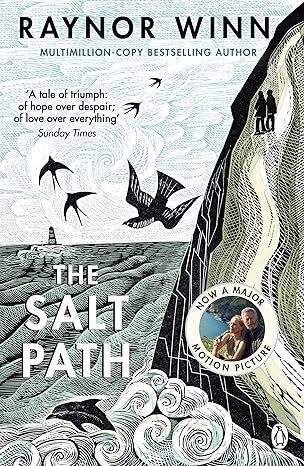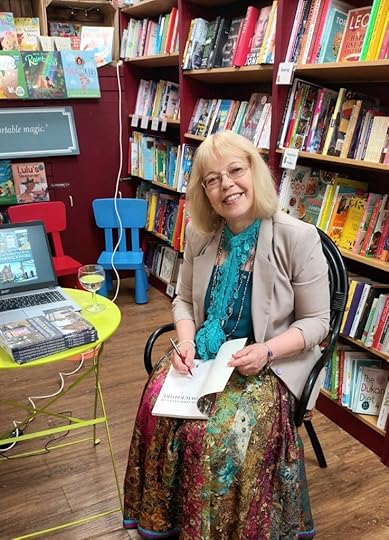The ‘Salt Path’ Controversy – my original review from 2020
Currently the UK news and social media are focussing on Raynor Winn and the truthfulness or otherwise of certain accounts in her highly successful nonfiction book ‘The Salt Path’ (first published by Penguin 2019).

Out of this has come a fascinating discussion about our expectations of truth and factual accuracy in memoirs and nonfiction books. As a nonfiction author myself, I’ve been following readers’ opinions with great interest.
Many people are using the phrase ‘it’s easy to say that in hindsight’ as they change their opinions of the book, in view of recent revelations by an investigative journalist in The Observer: either that, or they claim that they always thought certain parts of the book were dodgy.
Since then, Raynor Winn has published her own new account of events on her website.
Here lies the value of writing a book review soon after you’ve read a book – then you have authentic evidence of what you actually did think at the time!
I read the book about a year after it was published and here is my original review, which I then uploaded, as usually, to Amazon. So this is what I actually did think of it, without claiming any foresight !
MY 2020 REVIEW OF ‘THE SALT PATH’ BY RAYNOR WINNThe Salt Path by Raynor Winn
This is one of those books for which the one-star reviews on Amazon are almost more revealing and fascinating than the book itself. For those who would like insights into how the residents and the business-owners of Cornwall and Devon feel, this book and its most critical reviews are worth reading!
Personally, I found it a gripping read; and as a nonfiction writer myself, I know that is no mean feat. However, I don’t own a small West-Country coastal business and rely for my livelihood on tourist custom. As for the financial disaster that precedes the decision to go on the walk, I don’t have a close knowledge of the UK law or the benefits system. Many of the one-star reviewers of this book do, and some of them also have experience of a family member with a tragic life-limiting degenerative illness.
Although I have walked tiny bits of the Southwest Coastal Path and used to go on 50 mile sponsored walks from my local area and have climbed mountains in the Lake District and in Wales, I’ve never attempted such a walk as the one described in this book. I’m not a resident of Cornwall and Devon and have never enjoyed camping. I don’t believe I would dare to pitch a tent for free in a paid-for camping site with the intention of not paying; and even if I was tempted by desperation, I probably still wouldn’t do it; deeply engrained values would hold me back, and I’d choose wild camping in the gorse instead. So there are some aspects of this story which readers have doubted; and some of them reflect so poorly upon Raynor herself, I tend to feel they must be true. Though I would in her place have been highly motivated to exclude them from my book (which is easy enough to do).
Nevertheless, the psychological turmoil Raynor described herself as taking with her on her journey is highly relatable, and many of us would have felt that ourselves, when life turns bad and frustration, loss and perceived injustice comes our way. It was clear to me that the arduous walk she and Moth took, which did require dogged persistence and endurance, would have ultimately burned away those negative emotions.
By the time they had arrived at Lizard Point, Raynor seems to have reached a point of calm acceptance and to have shed the worst of her bitterness and self-pity. They stop at Polruan then take up an invitation to spend all winter at a friend’s Midlands sheep farm, doing renovation work, living in a shed, and working on the farm. Warm weather again finds them at Poole, ready to walk 250 miles back to Polruan.
They are persistent and dogged though I don’t think much of their survivalist skills especially as they live on a diet of rice, noodles, tuna and chocolate bars, by her own account.
At Talland Bay breakthrough comes: the moment of transformation. They meet a lady called Anna at a café. Anna offers them her flat to rent in Polruan, not far from the university at Portsmouth where Moth has decided to sign up as a mature student. We have a feeling they are saved at last, and as Raynor points out, they end up living where their path ends. I do like the end of the book.
………………………………………………………………………………………………………………………………………………………………..
Do let me know what you think. For instance, in a nonfiction book which is ‘confessional’ in style and purpose, do we have the right to expect 100% factual accuracy, and is the publisher morally reponsible to check that to the best of their ability? I’d love to have your comments!
 Invitation to support author
Invitation to support author
 Mailing LIst sign up invite – SC Skillman
Mailing LIst sign up invite – SC SkillmanJoin me on my writing journey and receive a monthly newsletter straight to your inbox, in which I share gems and snippets from my research and news and insights from the writing and publishing worlds, plus you’ll be the first to know when I have a new book coming out.
For regular readers of this blog, if you enjoy my articles and would like to support me, you can do that here, and I’ll be very grateful.
 Author SC SkillmanAbout Me
Author SC SkillmanAbout MeI live in Warwickshire, a county in central England, just south of Birmingham, together with my husband and son; and my daughter currently lives and works in Australia.
I was born and brought up in Orpington, a town on the southeastern edge of London. My first job was as a production secretary with the BBC. Later I lived for five years in Australia before returning to live and work in England.
My published output includes two novels Mystical Circles and A Passionate Spirit, and four highly illustrated nonfiction books Paranormal Warwickshire, Illustrated Tales of Warwickshire, A-Z of Warwick and Paranormal Gloucestershire.



